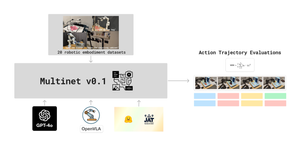Welcome to Research Log #015, where we document weekly research progress across the various initiatives in the Manifold Research Group. Also, the “Pulse of AI'' section includes breakthroughs in the broader research community we think are interesting!
Interested in contributing or just learning more? Check out the Github or join the conversation on Discord.
NEKO
The NEKO Project aims to build the first large scale, Open Source "Generalist" Model, trained on numerous modalities. You can learn more about it here.
- Language: We are currently adapting our tokenization and encoding approach to mirror that used by huggingface and open_lm, as they seem to follow best practices. Learn more through here.
- Language + Vision: Training is working for image-caption independently! There are some issues with the `token_masks`, but will have more to share on results soon. More through here.
- Dataset: We’re currently reviewing our original dataset availability analysis, as we push forward in building a larger, generalist, multimodal dataset. You can check out our analysis document here.
Agent Forge
- Action Models for the Web: We’re reviewing Mind2Web and other related papers, as we prepare to launch an initiative to build large, multimodal tool use models capable of taking action on the Web and Desktop computing environments.
Pulse of AI
- Eureka: They present an interesting way of doing Reinforcement Learning using LLMs. They train on dexterity and fine tune the target function using GPT-4. Thanks to one of the authors, Dr. Jim Fan for presenting all of this in this thread, which includes links to the paper and code.
- ToolChain: Efficient Action Space Navigation in Large Language Models with A* Search. Decision making in LLM Agents can be modeled using a tree. By using A*, the authors demonstrate an approach that identifies the low cost action branches and eliminates the high cost ones, leading to 7.35x less resources in planning and 2.31x less time in reasoning. More can be found here: https://huggingface.co/papers/2310.13227, which includes links to the paper and code.
If you want to see more of our updates as we work to explore and advance the field of Intelligent Systems, follow us on Twitter, Linkedin, and Mastodon!





